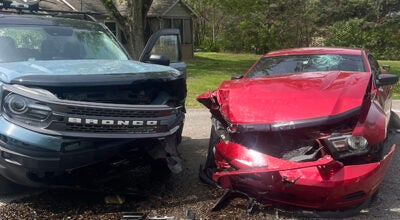Technology makes respect more important to discipline
Published 11:01 pm Monday, August 15, 2011
Dowagiac Board of Education devoted the bulk of its work session in the middle school cafeteria Monday night to an exchange with administrators that linked discipline policy with a fundamental change in the school culture.
“Specifically what we’re examining,” Superintendent Dr. Mark Daniel said, “is student responsibility and how we can utilize technology in the classroom. At the same time, there’s a trust level for that student use and a responsibility level and a respect level as well. As we start looking at some different delivery levels for instruction, such as more collaborative processes, we’re seeing that those types of systems are incorporating more and more discipline in the classroom environment. Board policies speak in a very general way about what student discipline is.”
“The easiest way to describe the difference that we’d like to bring forward for discussion,” school board President Larry Seurynck added, “is that a lot of rules are written in a negative way — thou shall not. In my experience, it didn’t make me feel bad to break the rules if I didn’t get caught, when really it should make you feel bad because at that point it’s a question upon your character.
“We build our discipline model out of respect, responsibility and trust that you will be a partner in this. It came up when we were talking about (a policy) that you won’t argue with or debate the faculty. It struck us as odd that you would lay that statement out there when, really, what the students need to understand is that if any one of us argue and debate in our workplace, if that’s the way you get along with people around you — confrontationally, argumentatively and getting in someone’s face — you’re not going to be very successful at your job or very welcome in the community.
“Philosphically,” Seurynck continued, “if we can teach our students at that level that the reason you don’t argue with me is that isn’t the way we operate as a society. If we can get our students to leave our schools understanding how to participate in society — and the traffic cop/don’t get caught is not a productive one in our society — If we can make that cultural shift to where people are dealt with with respect and responsibility and have pride in themselves, and not sneaking around behind our backs and not acting out in negative ways because it’s a poor reflection on themselves. That cultural shift puts more weight on kids and it puts more weight on us, too. We have to operate in a different way than putting the hammer down. I’m not suggesting that we become any less authoritative in consequences — we don’t soften up policies of what happens if when children act out and do something that’s not acceptable, it’s not acceptable because they’ve broken our trust.”
It transcends merely philosophical discussion, Daniel indicated.
“I’ll give you some specifics,” the superintendent said. “Cass County is working on an attendance policy through the juvenile court system such that regardless of what school district you’re in, there’s consistency in regards to attendance and truancy. What we’re trying to do with that is create a system with intervention at an earlier stage before they reach 10 or 12 days of unexcused absences. That’s one example we need to come to some agreement on.”
Daniel offered as a second example, “What about consequences, and are we consistent in our district? Vandalism is reported as a civic responsibility that you want to prevent in the future. It’s not to be tolerated when someone vandalizes a restroom. There’s a piece of our discipline policy where we want consistency. There’s K-5 and then there’s a shift 6-12” as students advance from one building to another.
“Are there levels of consequences that are consistent?” Daniel asked.
It’s apparently a discussion which began during the 2010-2011 school year when the board dealt with more middle school expulsions than for Union High.
Board member Stacy Leversen assured principals Paul Hartsig, Heather Nash, Marcy Hendress, Dawn Conner and Matt Severin and Dowagiac Education Association President Keith Klann that they are trying to fine-tune policies which already exist to make them better when it comes to such areas as engagement and ownership.
One outcome of the Disney Way in March was the realization that many employees don’t feel valued, which filters down to the students.
“We’re working on so many fronts we need a white board to keep track of them,” Seurynck said.






